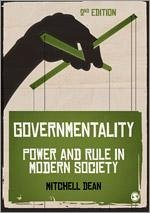Versandkostenfrei!
Versandfertig in 1-2 Wochen
Weitere Ausgaben:

PAYBACK Punkte
85 °P sammeln!





A fully revised and updated edition of this seminal introduction to and overview of the field of governmentality studies.
Mitchell Dean is Professor of Public Governance, Copenhagen Business School, Denmark, and Professor of Sociology at the University of Newcastle, Australia. His previous books include Governmentality: Power and Rule in Modern Society (1999, revised second edition, SAGE, 2010),The Constitution of Poverty: Toward a Genealogy of Liberal Governance (Routledge, 1991/2012), Critical and Effective Histories: Foucault¿s Methods and Historical Sociology (Routledge, 1994), and Governing Societies: Political Perspectives on Domestic and International Rule (Open University Press, 2007). His publications range across a large number of fields focusing on problems of government, sovereignty and power, liberalism and neoliberalism, political and social thought, historical sociology, and social and public policy. However he has also published on topics as diverse as risk management, e-government, political mythology, ancient societies, war and peace, contemporary art, cinema and fashion.
Produktdetails
- Verlag: SAGE Publications Ltd
- Second Edition
- Seitenzahl: 306
- Erscheinungstermin: 13. November 2009
- Englisch
- Abmessung: 250mm x 175mm x 21mm
- Gewicht: 710g
- ISBN-13: 9781847873835
- ISBN-10: 1847873839
- Artikelnr.: 27944156
Herstellerkennzeichnung
Libri GmbH
Europaallee 1
36244 Bad Hersfeld
gpsr@libri.de
Mitchell Dean has written an outstandingly clear and scholarly introduction to the central theses and methods of the analysis of the mentalities and techniques of rule He not only provides a guide to Foucault's own thought in this area, but he also draws upon other key thinkers in contemporary social theory to develop original and illuminating analysis of some principle formations of political power. Dean's book should become required reading not just for those interested in the work of Michel Foucault, but for all those who are concerned with the dilemmas of contemporary politics. Nikolas Rose
Für dieses Produkt wurde noch keine Bewertung abgegeben. Wir würden uns sehr freuen, wenn du die erste Bewertung schreibst!
Eine Bewertung schreiben
Eine Bewertung schreiben
Andere Kunden interessierten sich für














